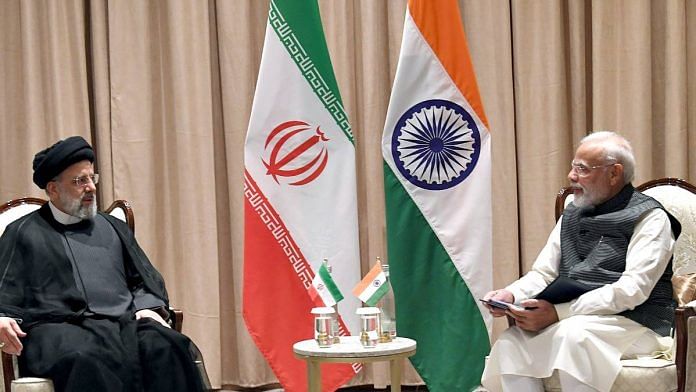Samarkand, Uzbekistan: Prime Minister Narendra Modi and Iranian President Ebrahim Raisi Friday took stock of the Iran Nuclear Agreement — officially known as the Joint Comprehensive Plan of Action (JCPOA) — even as the resumption of oil trade between New Delhi and Tehran remained stuck.
In an unprecedented move, India stopped buying oil from Iran in May 2019 following the imposition of US-led sanctions by the former Donald Trump administration. Since then, Tehran has been pushing New Delhi to resume the purchases. Before this, India had never adhered to such unilateral sanctions and always skirted them.
“President Raisi briefed the Prime Minister on the status of the JCPOA negotiations … During the meeting the two leaders discussed many important issues pertaining to the bilateral relationship, and expressed their desire for strengthening the relationship further,” said a press release issued by the Ministry of External Affairs.
The press statement didn’t mention anything concerning crude oil purchases or even energy security that has been a cornerstone of India-Iran bilateral ties. However, according to Foreign Secretary Vinay Kwatra, energy security continues to remain a key pillar in bilateral ties.
In response to a question by ThePrint, the foreign secretary said: “Questions relating to energy security have always been an important element of our discussions, whether it has been in the past that is during the pre-JCPOA days or even sometimes during the successful implementation of the JCPOA”.
“It’s quite natural that if the two leaders are meeting they will take stock what the status of that cooperation has,” Kwatra said at a media briefing in Samarkand post the meeting between Modi and Raisi.
He said that President Raisi briefed the Prime Minister on the state of JCPOA negotiations.
Held wide-ranging discussions with President Ebrahim Raisi. We talked about the growing India-Iran friendship and the scope to boost ties in sectors like energy, commerce and connectivity. pic.twitter.com/jrGI6ut7kM
— Narendra Modi (@narendramodi) September 16, 2022
Iran believes that if India can ignore the tough western sanctions imposed on Russia to buy oil from it, then New Delhi can do the same with Iranian oil.
The JCPOA is a landmark accord reached between Iran and several world powers, including the United States, in July 2015. Under the deal, Iran agreed to dismantle much of its nuclear programme and open its facilities to international inspections in exchange for billions of dollars in relief.
Apart from the five permanent members of the UN Security Council (China, France, Russia, the United Kingdom, and the United States) and Germany — collectively known as the P5+1 — the European Union also took part in the negotiations.
However, the Trump administration walked out of the deal in July 2018, claiming that it failed to curtail Iran’s nuclear programme. Iran began ignoring the restrictions under the deal a year later.
Despite the Joe Biden administration’s efforts to revive the deal, direct talks have yet to resume.
In an interview with Al Jazeera Friday, Raisi said it is imperative to lift the US-led sanctions if Washington wants to revive the agreement.
Also Read: ‘Follow Russia model, resume oil purchases’ — Iran asks India to ignore US sanctions
Modi pitches for Chabahar Port at SCO
The two leaders, as well as Uzbekistan’s President Shavkat Mirziyoyev, held discussions on Iran’s Chabahar port in an effort to make it the main hub for connectivity between India, Central Asia, and beyond.
The development of the Chabahar Port has huge strategic importance for India as it would allow India to bypass Pakistan and give it access to markets in Afghanistan and Central Asia.
“Chabahar port is an important element of the regional connectivity pillar, as I mentioned, and this figured extensively and in some detail in [the] Prime Minister’s discussion with the President of Iran and of course with the President of Uzbekistan who are deeply interested in ensuring that the connectivity between India and the Central Asian countries improves,” said Kwatra.
“And of course, for us, connectivity improves not just with Central Asian countries, but even beyond the region,” he added.
(Edited by Uttara Ramaswamy)
Also Read: Iran expects ‘friend’ India to resume oil purchases soon, says envoy Chegeni



